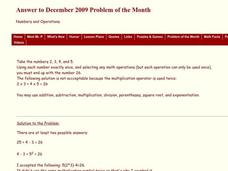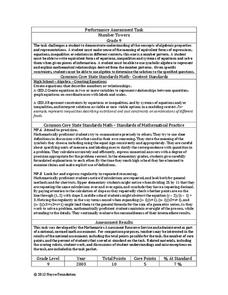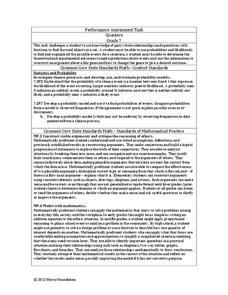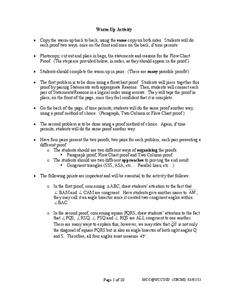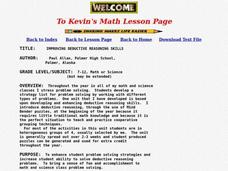Inside Mathematics
Quadratic (2006)
Most problems can be solved using more than one method. A worksheet includes just nine questions but many more ways to solve each. Scholars must graph, solve, and justify quadratic problems.
Curated OER
How to Reason
Young scholars practice their logical thinking skills. In this reasoning lesson, students complete tasks involving geometric shapes, place value, and odd/even numbers.
Curated OER
Numbers and Operations
In this algebra worksheet, students solve a word problem using algebraic expressions. An answer key is provided.
Curated OER
Proving Quadrilateral Properties
Working backwards can sometimes help you see a path to solving a problem. In this chapter, properites of quadrilaterials are proven by looking at flowcharts and working the probem backwards. Worked through examples are given, along with...
Curated OER
Fiddle Dee Diddle - It's Time For A Riddle
Energize your math class! They will use the story problem process to solve math riddle problems. They compute and solve problems involving addition and subtraction of 3- and 4- digit numbers and basic facts of multiplication and division...
Virginia Department of Education
High School Mathematics Geometry Vocabulary Word Wall Cards
Having a good working knowledge of math vocabulary is especially important for geometry learners. Here are 119 pages worth of wonderfully constructed definitions, constructions, formulas, properties, theorems, and postulates. This is a...
Curated OER
A Tale of Two Stories
Students develop their classification and math skills using the stories "The Three Little Pigs" (Galdone 1970) and "Cinderella" (Grimm and Grimm 1981). They compare the two stories using venn diagrams, simple maps, and problem solving.
Curated OER
Visualizing Multiplication
Upper graders represent multiplication of a two-digit number by a two-digit number as the area of a rectangle with dimensions of the two factors. They find patterns for the number of different base ten blocks in a rectangle representing...
Inside Mathematics
Quadrilaterals
What figure is formed by connecting the midpoints of the sides of a quadrilateral? The geometry assessment task has class members work through the process of determining the figure inscribed in a quadrilateral. Pupils use geometric...
Noyce Foundation
Ducklings
The class gets their mean and median all in a row with an assessment task that uses a population of ducklings to work with data displays and measures of central tendency. Pupils create a frequency chart and calculate the mean and median....
Inside Mathematics
Archery
Put the better archer in a box. The performance task has pupils compare the performance of two archers using box-and-whisker plots. The resource includes sample responses that are useful in comparing individuals' work to others.
Arizona Department of Education
Introduction to Integers
Welcome to the backward world of negative numbers. This introductory lesson teaches young mathematicians that negative numbers are simply the opposite of positive numbers as they use number lines to plot and compare single-digit integers.
Inside Mathematics
Number Towers
Number towers use addition or multiplication to ensure each level is equal. While this is common in factoring, it is often not used with algebraic equations. Solving these six questions relies on problem solving skills and being able to...
Noyce Foundation
Counters
For some, probability is a losing proposition. The assessment item requires an understanding of fraction operations, probability, and fair games. Pupils determine the fractional portions of an event. They continue to determine whether...
Curated OER
Roman Bernardo: Solving Linear Equations
Mathematicians use an inquiry method to solve linear equations. In this linear equations lesson, young scholars practice solving equations using addition, subtraction, multiplication and division. They solve multi-step equations and...
Curated OER
Sunshine Math- 2 Earth, VI
In this math applications worksheet, students solve 7 varied problems that include patterns, area, logic, ordered pairs, and reasoning.
Curated OER
The Secret of the Crystal Ball
Eighth graders use mathematical expressions to solve problems. In this basic properties of operations, 8th graders use prior knowledge and logical reasoning to solve equations. Students analyze an equation by solving a trick problem to...
Curated OER
Compare Length and Height
In this comparing length and height word problem learning exercise, students compare drawings of objects visually to determine which is longer, longest, shorter, and shortest and make a chart to solve logical reasoning problems. Students...
Curated OER
Explore Subtraction
Learnersare given 26 tables and graphs in which they must fill in missing numbers and graph equations. They subtract a given value of x from a constant number, and use a number line to subtract larger numbers from smaller ones resulting...
West Contra Costa Unified School District
Investigating Special Right Triangles
Scholars first investigate relationships in the side lengths of 30°-60°-90° triangles and 45°-45°-90° triangles. This knowledge then helps them solve problems later in the lesson about special right triangles.
Curated OER
Finding the Area of Shapes
In this area of shapes unit, upper graders participate in hands-on problem solving activities to find the formulas for the area of a parallelogram, a triangle, and a trapezoid. They manipulate the geoboard to explore relationships among...
Alabama Learning Exchange
Polygons-Changing Area Versus Changing Perimeter
Investigate the area and perimeter of polygons in this geometry lesson. Young geometers use grid paper to draw a quadrilateral and calculate its area and perimeter. They also read The Greedy Triangle to identify the changing shape of...
Curated OER
Using Patterns
In this math worksheet, students examine a drawing of a neighborhood made of geometric shapes. Students answer 5 questions about patterns they discover. Then students answer 5 word questions about address numbers by using logical...
Curated OER
Improving Deductive Reasoning Skills
Students recognize problems that may be solved using deductive reasoning, and develop aids to help them in solving these problems. They produce their own deductive reasoning puzzles for other students to solve.




